Organisational Behaviour Report: Employee Motivation and Performance
VerifiedAdded on 2021/02/21
|13
|4563
|77
Report
AI Summary
This report provides a comprehensive analysis of organisational behaviour within the context of Next Plc, a leading fast-fashion retailer. It delves into the influence of organisational culture, politics, and power dynamics on individual and team performance, examining concepts such as Handy's model of organisational culture and different types of power. The report investigates how these factors impact employee behaviour and the company's high employee turnover rate. Furthermore, it explores motivational theories, including content theories like Maslow's Hierarchy of Needs and process theories such as expectancy theory, to understand how to effectively motivate employees and improve performance. The report also discusses the characteristics of effective and ineffective teams and applies organisational behaviour philosophies within the organisational context of Next Plc, offering insights into fostering a positive and productive work environment.
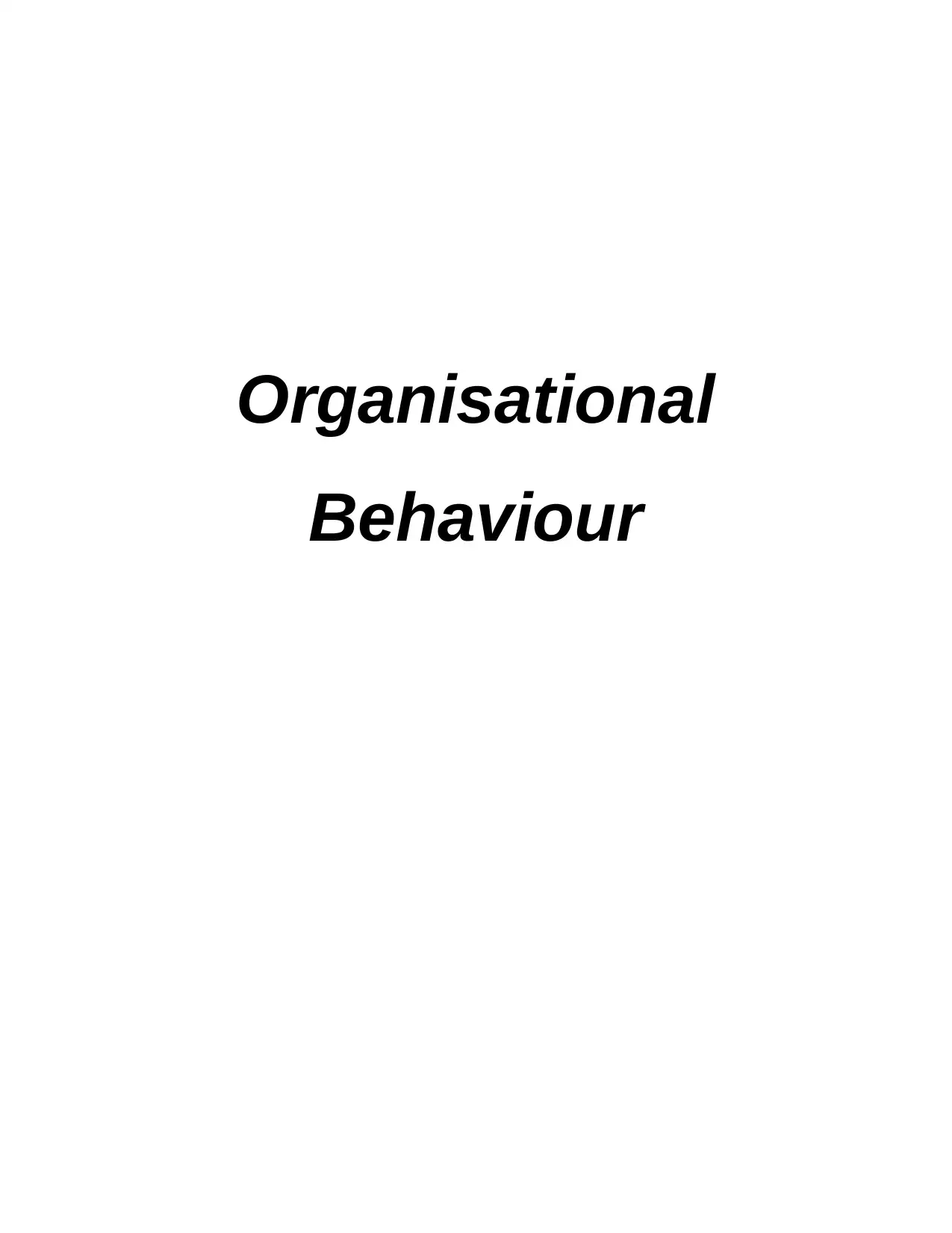
Organisational
Behaviour
Behaviour
Paraphrase This Document
Need a fresh take? Get an instant paraphrase of this document with our AI Paraphraser
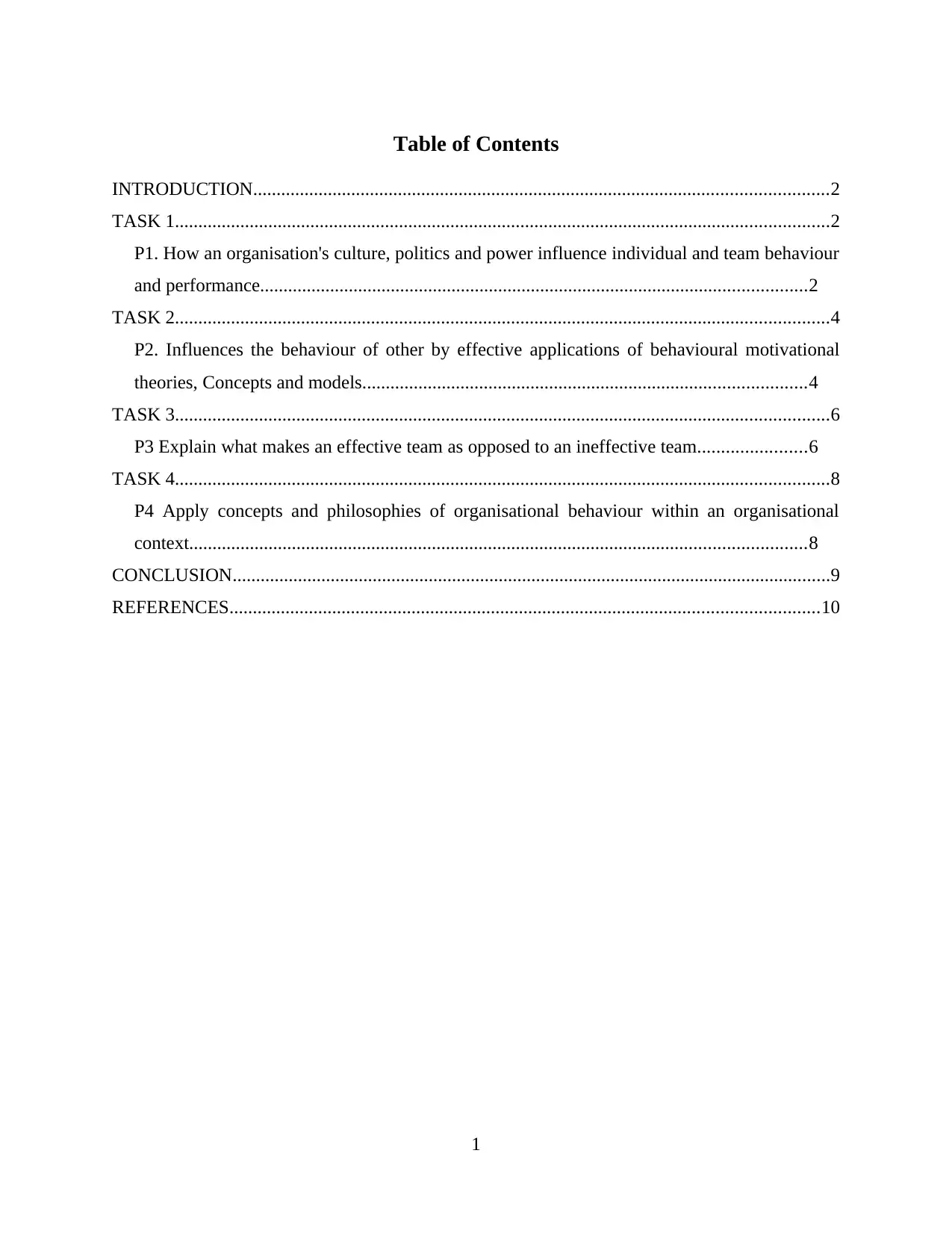
Table of Contents
INTRODUCTION...........................................................................................................................2
TASK 1............................................................................................................................................2
P1. How an organisation's culture, politics and power influence individual and team behaviour
and performance.....................................................................................................................2
TASK 2............................................................................................................................................4
P2. Influences the behaviour of other by effective applications of behavioural motivational
theories, Concepts and models...............................................................................................4
TASK 3............................................................................................................................................6
P3 Explain what makes an effective team as opposed to an ineffective team.......................6
TASK 4............................................................................................................................................8
P4 Apply concepts and philosophies of organisational behaviour within an organisational
context....................................................................................................................................8
CONCLUSION................................................................................................................................9
REFERENCES..............................................................................................................................10
1
INTRODUCTION...........................................................................................................................2
TASK 1............................................................................................................................................2
P1. How an organisation's culture, politics and power influence individual and team behaviour
and performance.....................................................................................................................2
TASK 2............................................................................................................................................4
P2. Influences the behaviour of other by effective applications of behavioural motivational
theories, Concepts and models...............................................................................................4
TASK 3............................................................................................................................................6
P3 Explain what makes an effective team as opposed to an ineffective team.......................6
TASK 4............................................................................................................................................8
P4 Apply concepts and philosophies of organisational behaviour within an organisational
context....................................................................................................................................8
CONCLUSION................................................................................................................................9
REFERENCES..............................................................................................................................10
1
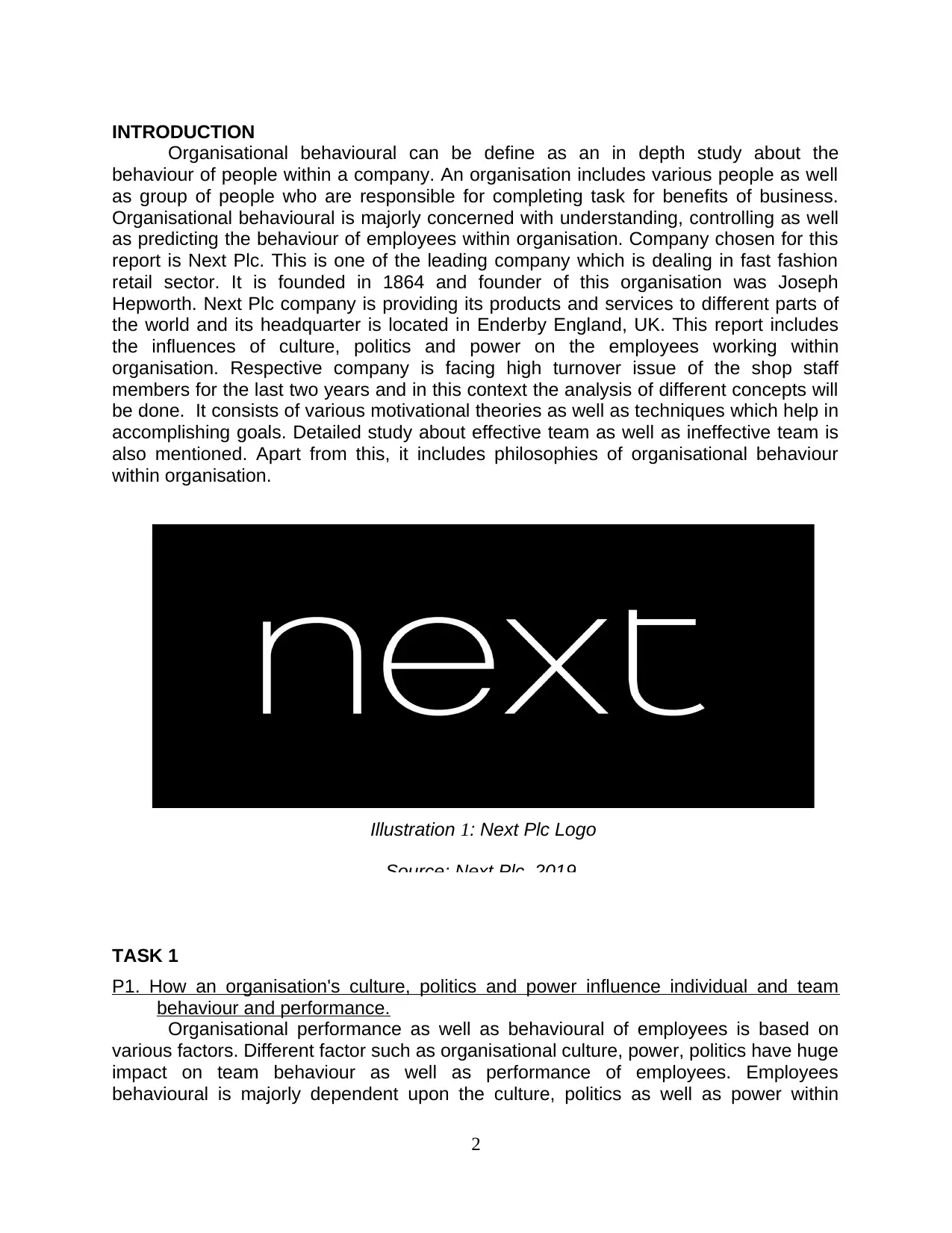
INTRODUCTION
Organisational behavioural can be define as an in depth study about the
behaviour of people within a company. An organisation includes various people as well
as group of people who are responsible for completing task for benefits of business.
Organisational behavioural is majorly concerned with understanding, controlling as well
as predicting the behaviour of employees within organisation. Company chosen for this
report is Next Plc. This is one of the leading company which is dealing in fast fashion
retail sector. It is founded in 1864 and founder of this organisation was Joseph
Hepworth. Next Plc company is providing its products and services to different parts of
the world and its headquarter is located in Enderby England, UK. This report includes
the influences of culture, politics and power on the employees working within
organisation. Respective company is facing high turnover issue of the shop staff
members for the last two years and in this context the analysis of different concepts will
be done. It consists of various motivational theories as well as techniques which help in
accomplishing goals. Detailed study about effective team as well as ineffective team is
also mentioned. Apart from this, it includes philosophies of organisational behaviour
within organisation.
TASK 1
P1. How an organisation's culture, politics and power influence individual and team
behaviour and performance.
Organisational performance as well as behavioural of employees is based on
various factors. Different factor such as organisational culture, power, politics have huge
impact on team behaviour as well as performance of employees. Employees
behavioural is majorly dependent upon the culture, politics as well as power within
2
Illustration 1: Next Plc Logo
Source: Next Plc, 2019.
Organisational behavioural can be define as an in depth study about the
behaviour of people within a company. An organisation includes various people as well
as group of people who are responsible for completing task for benefits of business.
Organisational behavioural is majorly concerned with understanding, controlling as well
as predicting the behaviour of employees within organisation. Company chosen for this
report is Next Plc. This is one of the leading company which is dealing in fast fashion
retail sector. It is founded in 1864 and founder of this organisation was Joseph
Hepworth. Next Plc company is providing its products and services to different parts of
the world and its headquarter is located in Enderby England, UK. This report includes
the influences of culture, politics and power on the employees working within
organisation. Respective company is facing high turnover issue of the shop staff
members for the last two years and in this context the analysis of different concepts will
be done. It consists of various motivational theories as well as techniques which help in
accomplishing goals. Detailed study about effective team as well as ineffective team is
also mentioned. Apart from this, it includes philosophies of organisational behaviour
within organisation.
TASK 1
P1. How an organisation's culture, politics and power influence individual and team
behaviour and performance.
Organisational performance as well as behavioural of employees is based on
various factors. Different factor such as organisational culture, power, politics have huge
impact on team behaviour as well as performance of employees. Employees
behavioural is majorly dependent upon the culture, politics as well as power within
2
Illustration 1: Next Plc Logo
Source: Next Plc, 2019.
⊘ This is a preview!⊘
Do you want full access?
Subscribe today to unlock all pages.

Trusted by 1+ million students worldwide
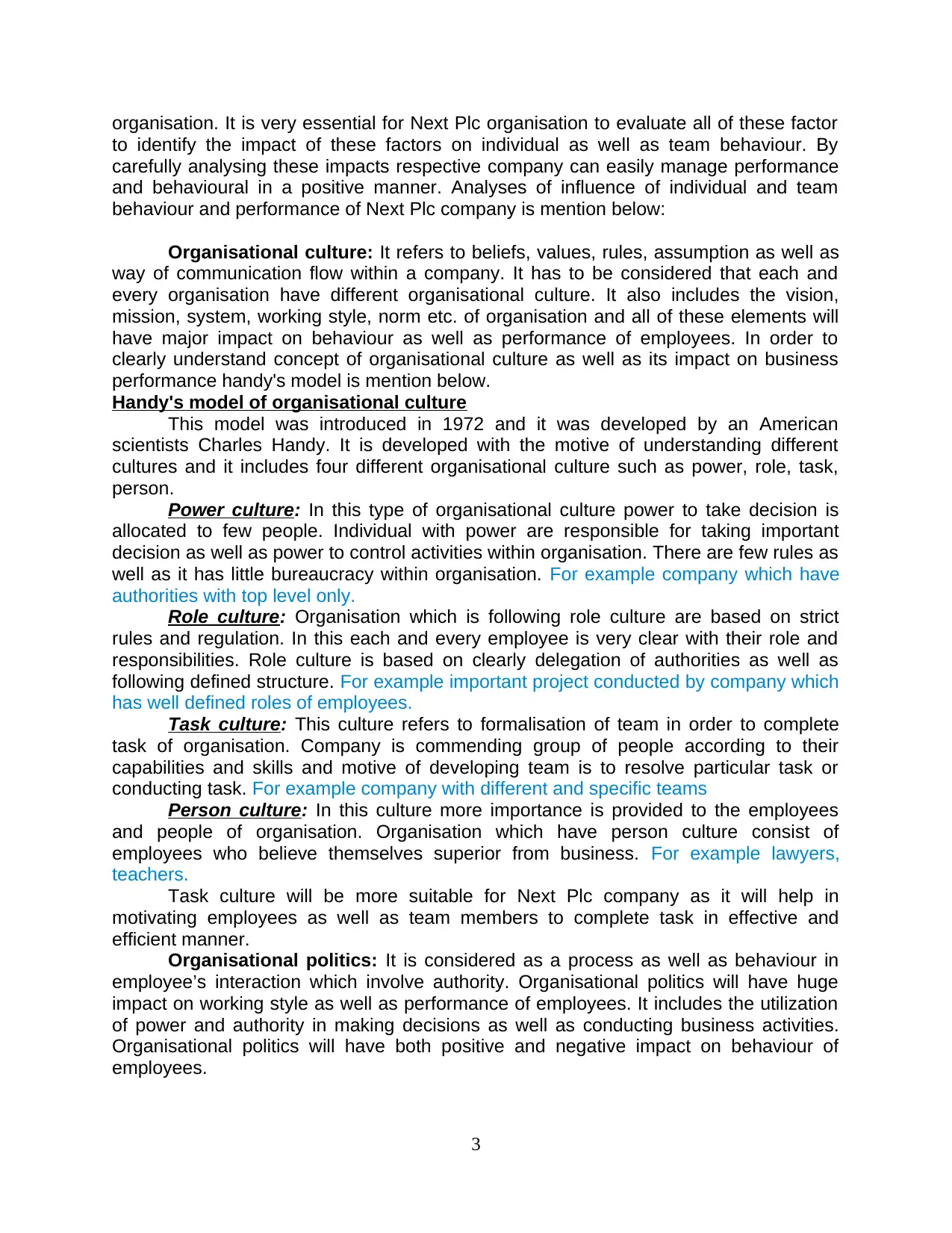
organisation. It is very essential for Next Plc organisation to evaluate all of these factor
to identify the impact of these factors on individual as well as team behaviour. By
carefully analysing these impacts respective company can easily manage performance
and behavioural in a positive manner. Analyses of influence of individual and team
behaviour and performance of Next Plc company is mention below:
Organisational culture: It refers to beliefs, values, rules, assumption as well as
way of communication flow within a company. It has to be considered that each and
every organisation have different organisational culture. It also includes the vision,
mission, system, working style, norm etc. of organisation and all of these elements will
have major impact on behaviour as well as performance of employees. In order to
clearly understand concept of organisational culture as well as its impact on business
performance handy's model is mention below.
Handy's model of organisational culture
This model was introduced in 1972 and it was developed by an American
scientists Charles Handy. It is developed with the motive of understanding different
cultures and it includes four different organisational culture such as power, role, task,
person.
Power culture: In this type of organisational culture power to take decision is
allocated to few people. Individual with power are responsible for taking important
decision as well as power to control activities within organisation. There are few rules as
well as it has little bureaucracy within organisation. For example company which have
authorities with top level only.
Role culture: Organisation which is following role culture are based on strict
rules and regulation. In this each and every employee is very clear with their role and
responsibilities. Role culture is based on clearly delegation of authorities as well as
following defined structure. For example important project conducted by company which
has well defined roles of employees.
Task culture: This culture refers to formalisation of team in order to complete
task of organisation. Company is commending group of people according to their
capabilities and skills and motive of developing team is to resolve particular task or
conducting task. For example company with different and specific teams
Person culture: In this culture more importance is provided to the employees
and people of organisation. Organisation which have person culture consist of
employees who believe themselves superior from business. For example lawyers,
teachers.
Task culture will be more suitable for Next Plc company as it will help in
motivating employees as well as team members to complete task in effective and
efficient manner.
Organisational politics: It is considered as a process as well as behaviour in
employee’s interaction which involve authority. Organisational politics will have huge
impact on working style as well as performance of employees. It includes the utilization
of power and authority in making decisions as well as conducting business activities.
Organisational politics will have both positive and negative impact on behaviour of
employees.
3
to identify the impact of these factors on individual as well as team behaviour. By
carefully analysing these impacts respective company can easily manage performance
and behavioural in a positive manner. Analyses of influence of individual and team
behaviour and performance of Next Plc company is mention below:
Organisational culture: It refers to beliefs, values, rules, assumption as well as
way of communication flow within a company. It has to be considered that each and
every organisation have different organisational culture. It also includes the vision,
mission, system, working style, norm etc. of organisation and all of these elements will
have major impact on behaviour as well as performance of employees. In order to
clearly understand concept of organisational culture as well as its impact on business
performance handy's model is mention below.
Handy's model of organisational culture
This model was introduced in 1972 and it was developed by an American
scientists Charles Handy. It is developed with the motive of understanding different
cultures and it includes four different organisational culture such as power, role, task,
person.
Power culture: In this type of organisational culture power to take decision is
allocated to few people. Individual with power are responsible for taking important
decision as well as power to control activities within organisation. There are few rules as
well as it has little bureaucracy within organisation. For example company which have
authorities with top level only.
Role culture: Organisation which is following role culture are based on strict
rules and regulation. In this each and every employee is very clear with their role and
responsibilities. Role culture is based on clearly delegation of authorities as well as
following defined structure. For example important project conducted by company which
has well defined roles of employees.
Task culture: This culture refers to formalisation of team in order to complete
task of organisation. Company is commending group of people according to their
capabilities and skills and motive of developing team is to resolve particular task or
conducting task. For example company with different and specific teams
Person culture: In this culture more importance is provided to the employees
and people of organisation. Organisation which have person culture consist of
employees who believe themselves superior from business. For example lawyers,
teachers.
Task culture will be more suitable for Next Plc company as it will help in
motivating employees as well as team members to complete task in effective and
efficient manner.
Organisational politics: It is considered as a process as well as behaviour in
employee’s interaction which involve authority. Organisational politics will have huge
impact on working style as well as performance of employees. It includes the utilization
of power and authority in making decisions as well as conducting business activities.
Organisational politics will have both positive and negative impact on behaviour of
employees.
3
Paraphrase This Document
Need a fresh take? Get an instant paraphrase of this document with our AI Paraphraser
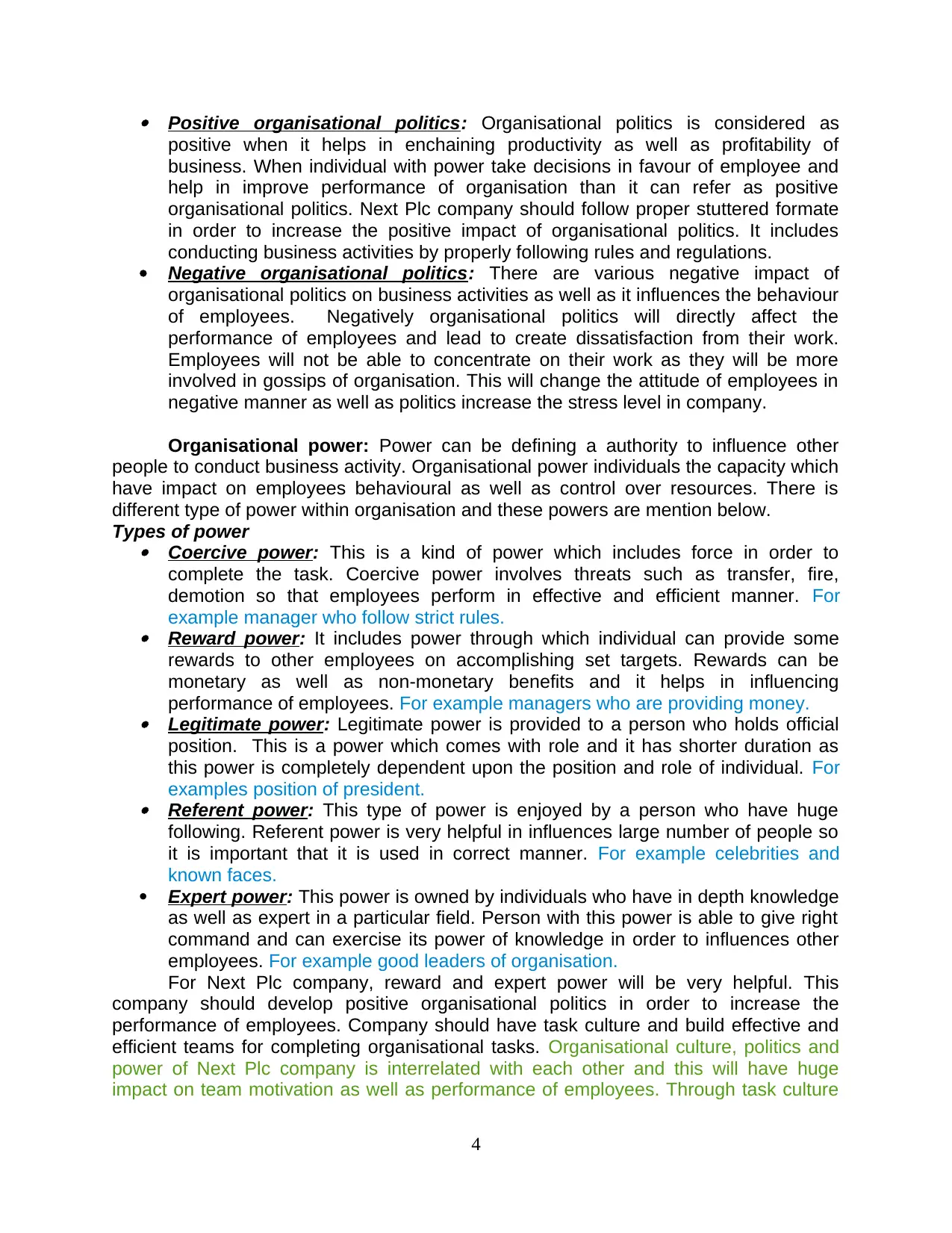
Positive organisational politics: Organisational politics is considered as
positive when it helps in enchaining productivity as well as profitability of
business. When individual with power take decisions in favour of employee and
help in improve performance of organisation than it can refer as positive
organisational politics. Next Plc company should follow proper stuttered formate
in order to increase the positive impact of organisational politics. It includes
conducting business activities by properly following rules and regulations.
Negative organisational politics: There are various negative impact of
organisational politics on business activities as well as it influences the behaviour
of employees. Negatively organisational politics will directly affect the
performance of employees and lead to create dissatisfaction from their work.
Employees will not be able to concentrate on their work as they will be more
involved in gossips of organisation. This will change the attitude of employees in
negative manner as well as politics increase the stress level in company.
Organisational power: Power can be defining a authority to influence other
people to conduct business activity. Organisational power individuals the capacity which
have impact on employees behavioural as well as control over resources. There is
different type of power within organisation and these powers are mention below.
Types of power
Coercive power: This is a kind of power which includes force in order to
complete the task. Coercive power involves threats such as transfer, fire,
demotion so that employees perform in effective and efficient manner. For
example manager who follow strict rules.
Reward power: It includes power through which individual can provide some
rewards to other employees on accomplishing set targets. Rewards can be
monetary as well as non-monetary benefits and it helps in influencing
performance of employees. For example managers who are providing money.
Legitimate power: Legitimate power is provided to a person who holds official
position. This is a power which comes with role and it has shorter duration as
this power is completely dependent upon the position and role of individual. For
examples position of president.
Referent power: This type of power is enjoyed by a person who have huge
following. Referent power is very helpful in influences large number of people so
it is important that it is used in correct manner. For example celebrities and
known faces.
Expert power: This power is owned by individuals who have in depth knowledge
as well as expert in a particular field. Person with this power is able to give right
command and can exercise its power of knowledge in order to influences other
employees. For example good leaders of organisation.
For Next Plc company, reward and expert power will be very helpful. This
company should develop positive organisational politics in order to increase the
performance of employees. Company should have task culture and build effective and
efficient teams for completing organisational tasks. Organisational culture, politics and
power of Next Plc company is interrelated with each other and this will have huge
impact on team motivation as well as performance of employees. Through task culture
4
positive when it helps in enchaining productivity as well as profitability of
business. When individual with power take decisions in favour of employee and
help in improve performance of organisation than it can refer as positive
organisational politics. Next Plc company should follow proper stuttered formate
in order to increase the positive impact of organisational politics. It includes
conducting business activities by properly following rules and regulations.
Negative organisational politics: There are various negative impact of
organisational politics on business activities as well as it influences the behaviour
of employees. Negatively organisational politics will directly affect the
performance of employees and lead to create dissatisfaction from their work.
Employees will not be able to concentrate on their work as they will be more
involved in gossips of organisation. This will change the attitude of employees in
negative manner as well as politics increase the stress level in company.
Organisational power: Power can be defining a authority to influence other
people to conduct business activity. Organisational power individuals the capacity which
have impact on employees behavioural as well as control over resources. There is
different type of power within organisation and these powers are mention below.
Types of power
Coercive power: This is a kind of power which includes force in order to
complete the task. Coercive power involves threats such as transfer, fire,
demotion so that employees perform in effective and efficient manner. For
example manager who follow strict rules.
Reward power: It includes power through which individual can provide some
rewards to other employees on accomplishing set targets. Rewards can be
monetary as well as non-monetary benefits and it helps in influencing
performance of employees. For example managers who are providing money.
Legitimate power: Legitimate power is provided to a person who holds official
position. This is a power which comes with role and it has shorter duration as
this power is completely dependent upon the position and role of individual. For
examples position of president.
Referent power: This type of power is enjoyed by a person who have huge
following. Referent power is very helpful in influences large number of people so
it is important that it is used in correct manner. For example celebrities and
known faces.
Expert power: This power is owned by individuals who have in depth knowledge
as well as expert in a particular field. Person with this power is able to give right
command and can exercise its power of knowledge in order to influences other
employees. For example good leaders of organisation.
For Next Plc company, reward and expert power will be very helpful. This
company should develop positive organisational politics in order to increase the
performance of employees. Company should have task culture and build effective and
efficient teams for completing organisational tasks. Organisational culture, politics and
power of Next Plc company is interrelated with each other and this will have huge
impact on team motivation as well as performance of employees. Through task culture
4
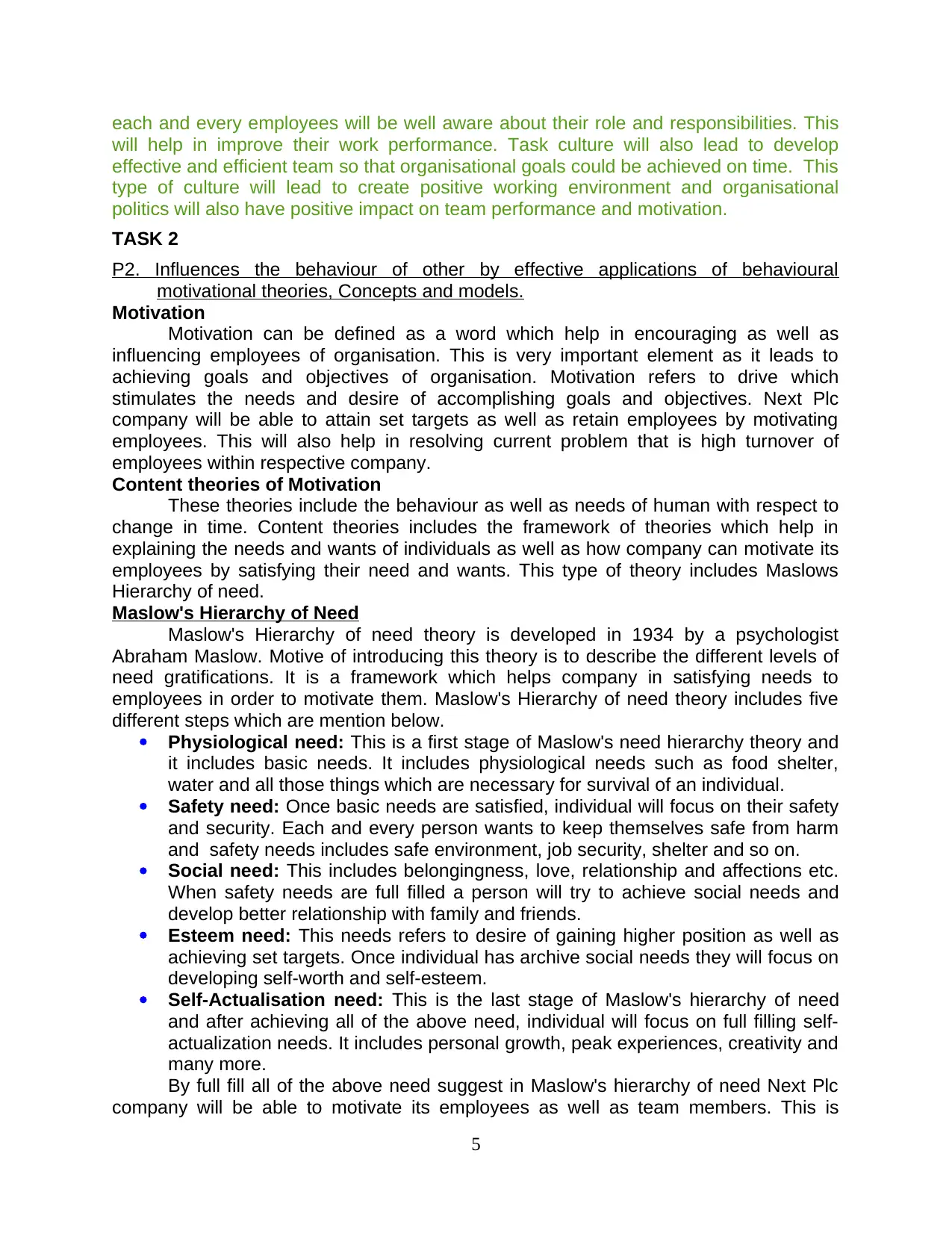
each and every employees will be well aware about their role and responsibilities. This
will help in improve their work performance. Task culture will also lead to develop
effective and efficient team so that organisational goals could be achieved on time. This
type of culture will lead to create positive working environment and organisational
politics will also have positive impact on team performance and motivation.
TASK 2
P2. Influences the behaviour of other by effective applications of behavioural
motivational theories, Concepts and models.
Motivation
Motivation can be defined as a word which help in encouraging as well as
influencing employees of organisation. This is very important element as it leads to
achieving goals and objectives of organisation. Motivation refers to drive which
stimulates the needs and desire of accomplishing goals and objectives. Next Plc
company will be able to attain set targets as well as retain employees by motivating
employees. This will also help in resolving current problem that is high turnover of
employees within respective company.
Content theories of Motivation
These theories include the behaviour as well as needs of human with respect to
change in time. Content theories includes the framework of theories which help in
explaining the needs and wants of individuals as well as how company can motivate its
employees by satisfying their need and wants. This type of theory includes Maslows
Hierarchy of need.
Maslow's Hierarchy of Need
Maslow's Hierarchy of need theory is developed in 1934 by a psychologist
Abraham Maslow. Motive of introducing this theory is to describe the different levels of
need gratifications. It is a framework which helps company in satisfying needs to
employees in order to motivate them. Maslow's Hierarchy of need theory includes five
different steps which are mention below.
Physiological need: This is a first stage of Maslow's need hierarchy theory and
it includes basic needs. It includes physiological needs such as food shelter,
water and all those things which are necessary for survival of an individual.
Safety need: Once basic needs are satisfied, individual will focus on their safety
and security. Each and every person wants to keep themselves safe from harm
and safety needs includes safe environment, job security, shelter and so on.
Social need: This includes belongingness, love, relationship and affections etc.
When safety needs are full filled a person will try to achieve social needs and
develop better relationship with family and friends.
Esteem need: This needs refers to desire of gaining higher position as well as
achieving set targets. Once individual has archive social needs they will focus on
developing self-worth and self-esteem.
Self-Actualisation need: This is the last stage of Maslow's hierarchy of need
and after achieving all of the above need, individual will focus on full filling self-
actualization needs. It includes personal growth, peak experiences, creativity and
many more.
By full fill all of the above need suggest in Maslow's hierarchy of need Next Plc
company will be able to motivate its employees as well as team members. This is
5
will help in improve their work performance. Task culture will also lead to develop
effective and efficient team so that organisational goals could be achieved on time. This
type of culture will lead to create positive working environment and organisational
politics will also have positive impact on team performance and motivation.
TASK 2
P2. Influences the behaviour of other by effective applications of behavioural
motivational theories, Concepts and models.
Motivation
Motivation can be defined as a word which help in encouraging as well as
influencing employees of organisation. This is very important element as it leads to
achieving goals and objectives of organisation. Motivation refers to drive which
stimulates the needs and desire of accomplishing goals and objectives. Next Plc
company will be able to attain set targets as well as retain employees by motivating
employees. This will also help in resolving current problem that is high turnover of
employees within respective company.
Content theories of Motivation
These theories include the behaviour as well as needs of human with respect to
change in time. Content theories includes the framework of theories which help in
explaining the needs and wants of individuals as well as how company can motivate its
employees by satisfying their need and wants. This type of theory includes Maslows
Hierarchy of need.
Maslow's Hierarchy of Need
Maslow's Hierarchy of need theory is developed in 1934 by a psychologist
Abraham Maslow. Motive of introducing this theory is to describe the different levels of
need gratifications. It is a framework which helps company in satisfying needs to
employees in order to motivate them. Maslow's Hierarchy of need theory includes five
different steps which are mention below.
Physiological need: This is a first stage of Maslow's need hierarchy theory and
it includes basic needs. It includes physiological needs such as food shelter,
water and all those things which are necessary for survival of an individual.
Safety need: Once basic needs are satisfied, individual will focus on their safety
and security. Each and every person wants to keep themselves safe from harm
and safety needs includes safe environment, job security, shelter and so on.
Social need: This includes belongingness, love, relationship and affections etc.
When safety needs are full filled a person will try to achieve social needs and
develop better relationship with family and friends.
Esteem need: This needs refers to desire of gaining higher position as well as
achieving set targets. Once individual has archive social needs they will focus on
developing self-worth and self-esteem.
Self-Actualisation need: This is the last stage of Maslow's hierarchy of need
and after achieving all of the above need, individual will focus on full filling self-
actualization needs. It includes personal growth, peak experiences, creativity and
many more.
By full fill all of the above need suggest in Maslow's hierarchy of need Next Plc
company will be able to motivate its employees as well as team members. This is
5
⊘ This is a preview!⊘
Do you want full access?
Subscribe today to unlock all pages.

Trusted by 1+ million students worldwide
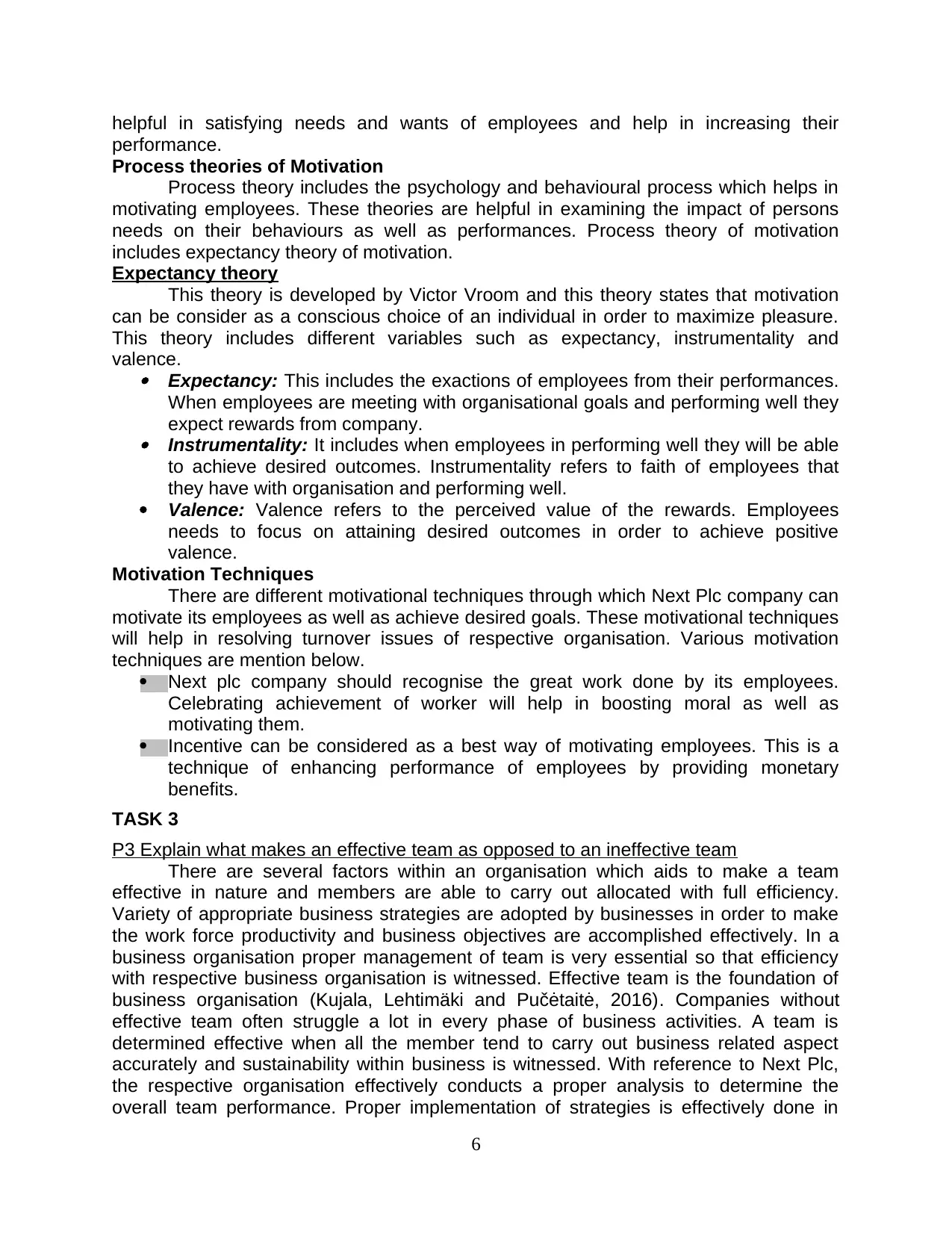
helpful in satisfying needs and wants of employees and help in increasing their
performance.
Process theories of Motivation
Process theory includes the psychology and behavioural process which helps in
motivating employees. These theories are helpful in examining the impact of persons
needs on their behaviours as well as performances. Process theory of motivation
includes expectancy theory of motivation.
Expectancy theory
This theory is developed by Victor Vroom and this theory states that motivation
can be consider as a conscious choice of an individual in order to maximize pleasure.
This theory includes different variables such as expectancy, instrumentality and
valence.
Expectancy: This includes the exactions of employees from their performances.
When employees are meeting with organisational goals and performing well they
expect rewards from company.
Instrumentality: It includes when employees in performing well they will be able
to achieve desired outcomes. Instrumentality refers to faith of employees that
they have with organisation and performing well.
Valence: Valence refers to the perceived value of the rewards. Employees
needs to focus on attaining desired outcomes in order to achieve positive
valence.
Motivation Techniques
There are different motivational techniques through which Next Plc company can
motivate its employees as well as achieve desired goals. These motivational techniques
will help in resolving turnover issues of respective organisation. Various motivation
techniques are mention below.
Next plc company should recognise the great work done by its employees.
Celebrating achievement of worker will help in boosting moral as well as
motivating them.
Incentive can be considered as a best way of motivating employees. This is a
technique of enhancing performance of employees by providing monetary
benefits.
TASK 3
P3 Explain what makes an effective team as opposed to an ineffective team
There are several factors within an organisation which aids to make a team
effective in nature and members are able to carry out allocated with full efficiency.
Variety of appropriate business strategies are adopted by businesses in order to make
the work force productivity and business objectives are accomplished effectively. In a
business organisation proper management of team is very essential so that efficiency
with respective business organisation is witnessed. Effective team is the foundation of
business organisation (Kujala, Lehtimäki and Pučėtaitė, 2016). Companies without
effective team often struggle a lot in every phase of business activities. A team is
determined effective when all the member tend to carry out business related aspect
accurately and sustainability within business is witnessed. With reference to Next Plc,
the respective organisation effectively conducts a proper analysis to determine the
overall team performance. Proper implementation of strategies is effectively done in
6
performance.
Process theories of Motivation
Process theory includes the psychology and behavioural process which helps in
motivating employees. These theories are helpful in examining the impact of persons
needs on their behaviours as well as performances. Process theory of motivation
includes expectancy theory of motivation.
Expectancy theory
This theory is developed by Victor Vroom and this theory states that motivation
can be consider as a conscious choice of an individual in order to maximize pleasure.
This theory includes different variables such as expectancy, instrumentality and
valence.
Expectancy: This includes the exactions of employees from their performances.
When employees are meeting with organisational goals and performing well they
expect rewards from company.
Instrumentality: It includes when employees in performing well they will be able
to achieve desired outcomes. Instrumentality refers to faith of employees that
they have with organisation and performing well.
Valence: Valence refers to the perceived value of the rewards. Employees
needs to focus on attaining desired outcomes in order to achieve positive
valence.
Motivation Techniques
There are different motivational techniques through which Next Plc company can
motivate its employees as well as achieve desired goals. These motivational techniques
will help in resolving turnover issues of respective organisation. Various motivation
techniques are mention below.
Next plc company should recognise the great work done by its employees.
Celebrating achievement of worker will help in boosting moral as well as
motivating them.
Incentive can be considered as a best way of motivating employees. This is a
technique of enhancing performance of employees by providing monetary
benefits.
TASK 3
P3 Explain what makes an effective team as opposed to an ineffective team
There are several factors within an organisation which aids to make a team
effective in nature and members are able to carry out allocated with full efficiency.
Variety of appropriate business strategies are adopted by businesses in order to make
the work force productivity and business objectives are accomplished effectively. In a
business organisation proper management of team is very essential so that efficiency
with respective business organisation is witnessed. Effective team is the foundation of
business organisation (Kujala, Lehtimäki and Pučėtaitė, 2016). Companies without
effective team often struggle a lot in every phase of business activities. A team is
determined effective when all the member tend to carry out business related aspect
accurately and sustainability within business is witnessed. With reference to Next Plc,
the respective organisation effectively conducts a proper analysis to determine the
overall team performance. Proper implementation of strategies is effectively done in
6
Paraphrase This Document
Need a fresh take? Get an instant paraphrase of this document with our AI Paraphraser
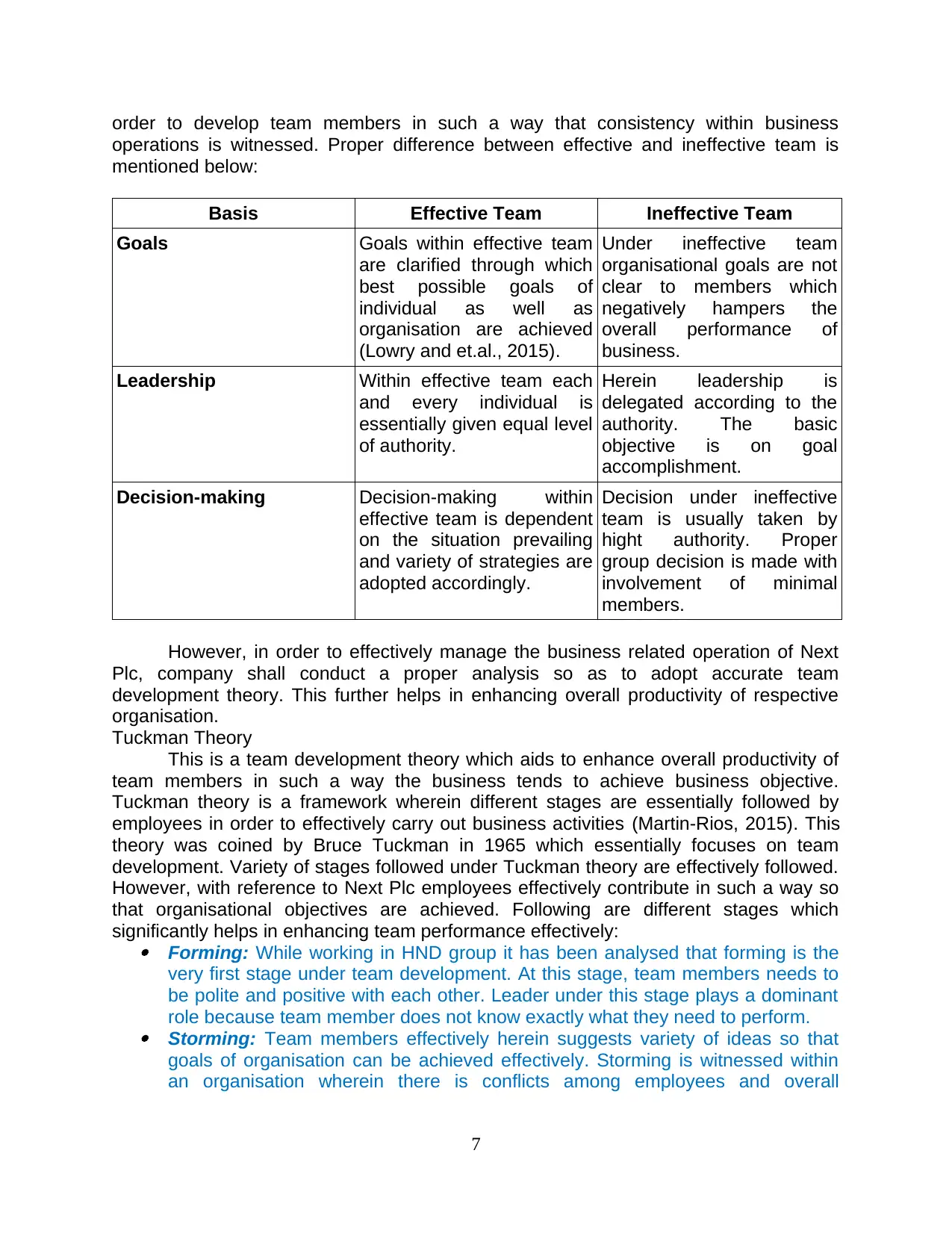
order to develop team members in such a way that consistency within business
operations is witnessed. Proper difference between effective and ineffective team is
mentioned below:
Basis Effective Team Ineffective Team
Goals Goals within effective team
are clarified through which
best possible goals of
individual as well as
organisation are achieved
(Lowry and et.al., 2015).
Under ineffective team
organisational goals are not
clear to members which
negatively hampers the
overall performance of
business.
Leadership Within effective team each
and every individual is
essentially given equal level
of authority.
Herein leadership is
delegated according to the
authority. The basic
objective is on goal
accomplishment.
Decision-making Decision-making within
effective team is dependent
on the situation prevailing
and variety of strategies are
adopted accordingly.
Decision under ineffective
team is usually taken by
hight authority. Proper
group decision is made with
involvement of minimal
members.
However, in order to effectively manage the business related operation of Next
Plc, company shall conduct a proper analysis so as to adopt accurate team
development theory. This further helps in enhancing overall productivity of respective
organisation.
Tuckman Theory
This is a team development theory which aids to enhance overall productivity of
team members in such a way the business tends to achieve business objective.
Tuckman theory is a framework wherein different stages are essentially followed by
employees in order to effectively carry out business activities (Martin-Rios, 2015). This
theory was coined by Bruce Tuckman in 1965 which essentially focuses on team
development. Variety of stages followed under Tuckman theory are effectively followed.
However, with reference to Next Plc employees effectively contribute in such a way so
that organisational objectives are achieved. Following are different stages which
significantly helps in enhancing team performance effectively:
Forming: While working in HND group it has been analysed that forming is the
very first stage under team development. At this stage, team members needs to
be polite and positive with each other. Leader under this stage plays a dominant
role because team member does not know exactly what they need to perform.
Storming: Team members effectively herein suggests variety of ideas so that
goals of organisation can be achieved effectively. Storming is witnessed within
an organisation wherein there is conflicts among employees and overall
7
operations is witnessed. Proper difference between effective and ineffective team is
mentioned below:
Basis Effective Team Ineffective Team
Goals Goals within effective team
are clarified through which
best possible goals of
individual as well as
organisation are achieved
(Lowry and et.al., 2015).
Under ineffective team
organisational goals are not
clear to members which
negatively hampers the
overall performance of
business.
Leadership Within effective team each
and every individual is
essentially given equal level
of authority.
Herein leadership is
delegated according to the
authority. The basic
objective is on goal
accomplishment.
Decision-making Decision-making within
effective team is dependent
on the situation prevailing
and variety of strategies are
adopted accordingly.
Decision under ineffective
team is usually taken by
hight authority. Proper
group decision is made with
involvement of minimal
members.
However, in order to effectively manage the business related operation of Next
Plc, company shall conduct a proper analysis so as to adopt accurate team
development theory. This further helps in enhancing overall productivity of respective
organisation.
Tuckman Theory
This is a team development theory which aids to enhance overall productivity of
team members in such a way the business tends to achieve business objective.
Tuckman theory is a framework wherein different stages are essentially followed by
employees in order to effectively carry out business activities (Martin-Rios, 2015). This
theory was coined by Bruce Tuckman in 1965 which essentially focuses on team
development. Variety of stages followed under Tuckman theory are effectively followed.
However, with reference to Next Plc employees effectively contribute in such a way so
that organisational objectives are achieved. Following are different stages which
significantly helps in enhancing team performance effectively:
Forming: While working in HND group it has been analysed that forming is the
very first stage under team development. At this stage, team members needs to
be polite and positive with each other. Leader under this stage plays a dominant
role because team member does not know exactly what they need to perform.
Storming: Team members effectively herein suggests variety of ideas so that
goals of organisation can be achieved effectively. Storming is witnessed within
an organisation wherein there is conflicts among employees and overall
7
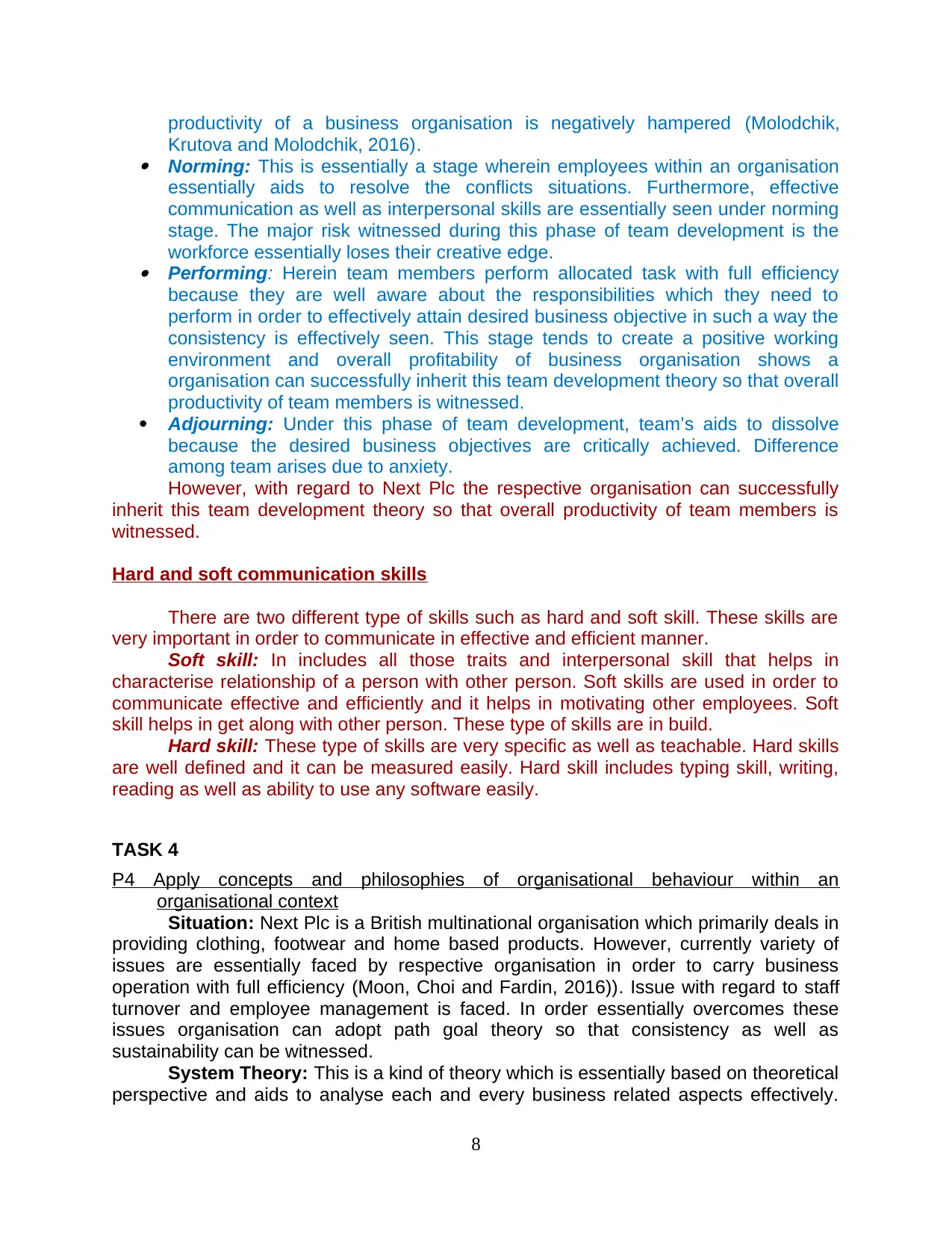
productivity of a business organisation is negatively hampered (Molodchik,
Krutova and Molodchik, 2016).
Norming: This is essentially a stage wherein employees within an organisation
essentially aids to resolve the conflicts situations. Furthermore, effective
communication as well as interpersonal skills are essentially seen under norming
stage. The major risk witnessed during this phase of team development is the
workforce essentially loses their creative edge.
Performing: Herein team members perform allocated task with full efficiency
because they are well aware about the responsibilities which they need to
perform in order to effectively attain desired business objective in such a way the
consistency is effectively seen. This stage tends to create a positive working
environment and overall profitability of business organisation shows a
organisation can successfully inherit this team development theory so that overall
productivity of team members is witnessed.
Adjourning: Under this phase of team development, team’s aids to dissolve
because the desired business objectives are critically achieved. Difference
among team arises due to anxiety.
However, with regard to Next Plc the respective organisation can successfully
inherit this team development theory so that overall productivity of team members is
witnessed.
Hard and soft communication skills
There are two different type of skills such as hard and soft skill. These skills are
very important in order to communicate in effective and efficient manner.
Soft skill: In includes all those traits and interpersonal skill that helps in
characterise relationship of a person with other person. Soft skills are used in order to
communicate effective and efficiently and it helps in motivating other employees. Soft
skill helps in get along with other person. These type of skills are in build.
Hard skill: These type of skills are very specific as well as teachable. Hard skills
are well defined and it can be measured easily. Hard skill includes typing skill, writing,
reading as well as ability to use any software easily.
TASK 4
P4 Apply concepts and philosophies of organisational behaviour within an
organisational context
Situation: Next Plc is a British multinational organisation which primarily deals in
providing clothing, footwear and home based products. However, currently variety of
issues are essentially faced by respective organisation in order to carry business
operation with full efficiency (Moon, Choi and Fardin, 2016)). Issue with regard to staff
turnover and employee management is faced. In order essentially overcomes these
issues organisation can adopt path goal theory so that consistency as well as
sustainability can be witnessed.
System Theory: This is a kind of theory which is essentially based on theoretical
perspective and aids to analyse each and every business related aspects effectively.
8
Krutova and Molodchik, 2016).
Norming: This is essentially a stage wherein employees within an organisation
essentially aids to resolve the conflicts situations. Furthermore, effective
communication as well as interpersonal skills are essentially seen under norming
stage. The major risk witnessed during this phase of team development is the
workforce essentially loses their creative edge.
Performing: Herein team members perform allocated task with full efficiency
because they are well aware about the responsibilities which they need to
perform in order to effectively attain desired business objective in such a way the
consistency is effectively seen. This stage tends to create a positive working
environment and overall profitability of business organisation shows a
organisation can successfully inherit this team development theory so that overall
productivity of team members is witnessed.
Adjourning: Under this phase of team development, team’s aids to dissolve
because the desired business objectives are critically achieved. Difference
among team arises due to anxiety.
However, with regard to Next Plc the respective organisation can successfully
inherit this team development theory so that overall productivity of team members is
witnessed.
Hard and soft communication skills
There are two different type of skills such as hard and soft skill. These skills are
very important in order to communicate in effective and efficient manner.
Soft skill: In includes all those traits and interpersonal skill that helps in
characterise relationship of a person with other person. Soft skills are used in order to
communicate effective and efficiently and it helps in motivating other employees. Soft
skill helps in get along with other person. These type of skills are in build.
Hard skill: These type of skills are very specific as well as teachable. Hard skills
are well defined and it can be measured easily. Hard skill includes typing skill, writing,
reading as well as ability to use any software easily.
TASK 4
P4 Apply concepts and philosophies of organisational behaviour within an
organisational context
Situation: Next Plc is a British multinational organisation which primarily deals in
providing clothing, footwear and home based products. However, currently variety of
issues are essentially faced by respective organisation in order to carry business
operation with full efficiency (Moon, Choi and Fardin, 2016)). Issue with regard to staff
turnover and employee management is faced. In order essentially overcomes these
issues organisation can adopt path goal theory so that consistency as well as
sustainability can be witnessed.
System Theory: This is a kind of theory which is essentially based on theoretical
perspective and aids to analyse each and every business related aspects effectively.
8
⊘ This is a preview!⊘
Do you want full access?
Subscribe today to unlock all pages.

Trusted by 1+ million students worldwide
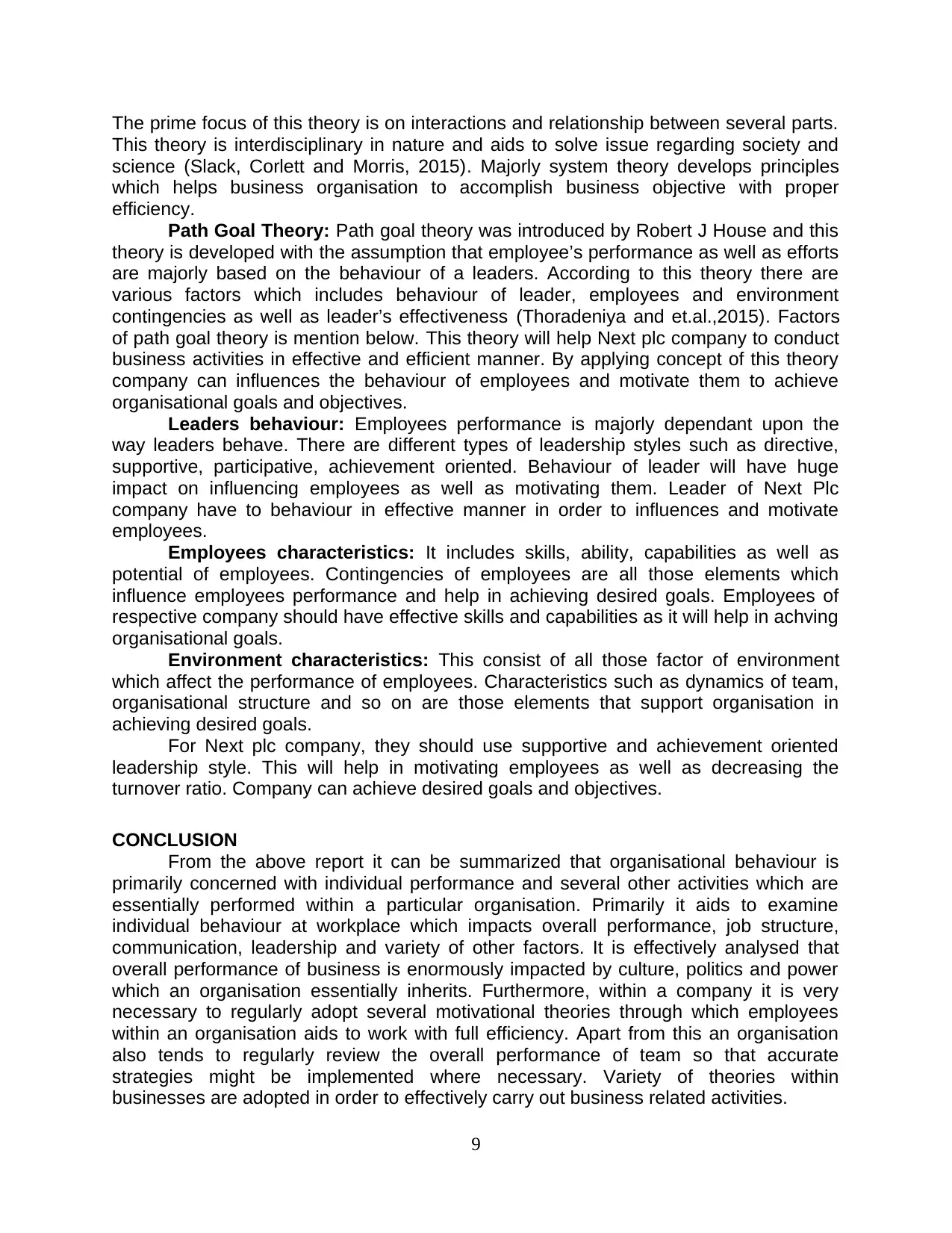
The prime focus of this theory is on interactions and relationship between several parts.
This theory is interdisciplinary in nature and aids to solve issue regarding society and
science (Slack, Corlett and Morris, 2015). Majorly system theory develops principles
which helps business organisation to accomplish business objective with proper
efficiency.
Path Goal Theory: Path goal theory was introduced by Robert J House and this
theory is developed with the assumption that employee’s performance as well as efforts
are majorly based on the behaviour of a leaders. According to this theory there are
various factors which includes behaviour of leader, employees and environment
contingencies as well as leader’s effectiveness (Thoradeniya and et.al.,2015). Factors
of path goal theory is mention below. This theory will help Next plc company to conduct
business activities in effective and efficient manner. By applying concept of this theory
company can influences the behaviour of employees and motivate them to achieve
organisational goals and objectives.
Leaders behaviour: Employees performance is majorly dependant upon the
way leaders behave. There are different types of leadership styles such as directive,
supportive, participative, achievement oriented. Behaviour of leader will have huge
impact on influencing employees as well as motivating them. Leader of Next Plc
company have to behaviour in effective manner in order to influences and motivate
employees.
Employees characteristics: It includes skills, ability, capabilities as well as
potential of employees. Contingencies of employees are all those elements which
influence employees performance and help in achieving desired goals. Employees of
respective company should have effective skills and capabilities as it will help in achving
organisational goals.
Environment characteristics: This consist of all those factor of environment
which affect the performance of employees. Characteristics such as dynamics of team,
organisational structure and so on are those elements that support organisation in
achieving desired goals.
For Next plc company, they should use supportive and achievement oriented
leadership style. This will help in motivating employees as well as decreasing the
turnover ratio. Company can achieve desired goals and objectives.
CONCLUSION
From the above report it can be summarized that organisational behaviour is
primarily concerned with individual performance and several other activities which are
essentially performed within a particular organisation. Primarily it aids to examine
individual behaviour at workplace which impacts overall performance, job structure,
communication, leadership and variety of other factors. It is effectively analysed that
overall performance of business is enormously impacted by culture, politics and power
which an organisation essentially inherits. Furthermore, within a company it is very
necessary to regularly adopt several motivational theories through which employees
within an organisation aids to work with full efficiency. Apart from this an organisation
also tends to regularly review the overall performance of team so that accurate
strategies might be implemented where necessary. Variety of theories within
businesses are adopted in order to effectively carry out business related activities.
9
This theory is interdisciplinary in nature and aids to solve issue regarding society and
science (Slack, Corlett and Morris, 2015). Majorly system theory develops principles
which helps business organisation to accomplish business objective with proper
efficiency.
Path Goal Theory: Path goal theory was introduced by Robert J House and this
theory is developed with the assumption that employee’s performance as well as efforts
are majorly based on the behaviour of a leaders. According to this theory there are
various factors which includes behaviour of leader, employees and environment
contingencies as well as leader’s effectiveness (Thoradeniya and et.al.,2015). Factors
of path goal theory is mention below. This theory will help Next plc company to conduct
business activities in effective and efficient manner. By applying concept of this theory
company can influences the behaviour of employees and motivate them to achieve
organisational goals and objectives.
Leaders behaviour: Employees performance is majorly dependant upon the
way leaders behave. There are different types of leadership styles such as directive,
supportive, participative, achievement oriented. Behaviour of leader will have huge
impact on influencing employees as well as motivating them. Leader of Next Plc
company have to behaviour in effective manner in order to influences and motivate
employees.
Employees characteristics: It includes skills, ability, capabilities as well as
potential of employees. Contingencies of employees are all those elements which
influence employees performance and help in achieving desired goals. Employees of
respective company should have effective skills and capabilities as it will help in achving
organisational goals.
Environment characteristics: This consist of all those factor of environment
which affect the performance of employees. Characteristics such as dynamics of team,
organisational structure and so on are those elements that support organisation in
achieving desired goals.
For Next plc company, they should use supportive and achievement oriented
leadership style. This will help in motivating employees as well as decreasing the
turnover ratio. Company can achieve desired goals and objectives.
CONCLUSION
From the above report it can be summarized that organisational behaviour is
primarily concerned with individual performance and several other activities which are
essentially performed within a particular organisation. Primarily it aids to examine
individual behaviour at workplace which impacts overall performance, job structure,
communication, leadership and variety of other factors. It is effectively analysed that
overall performance of business is enormously impacted by culture, politics and power
which an organisation essentially inherits. Furthermore, within a company it is very
necessary to regularly adopt several motivational theories through which employees
within an organisation aids to work with full efficiency. Apart from this an organisation
also tends to regularly review the overall performance of team so that accurate
strategies might be implemented where necessary. Variety of theories within
businesses are adopted in order to effectively carry out business related activities.
9
Paraphrase This Document
Need a fresh take? Get an instant paraphrase of this document with our AI Paraphraser

10
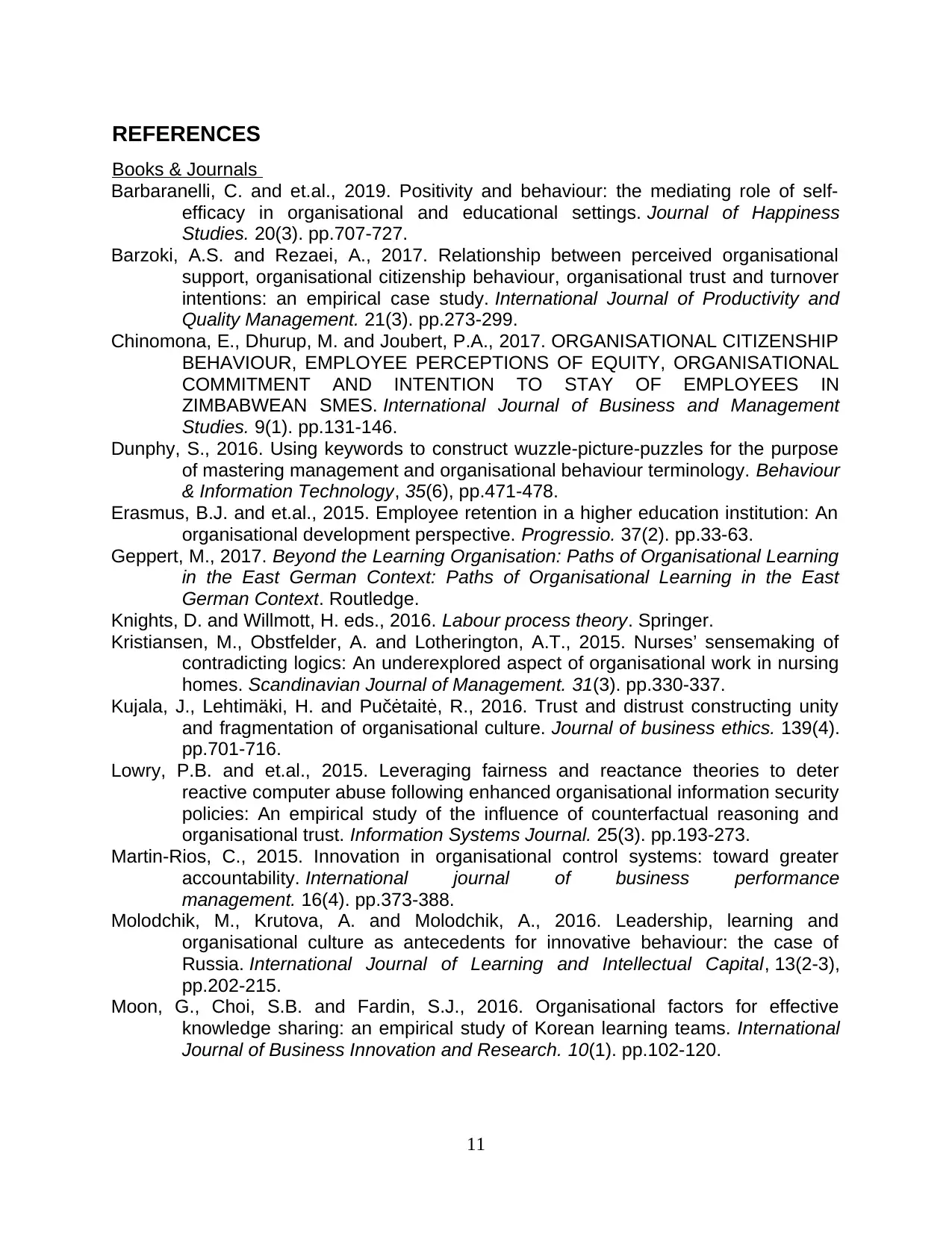
REFERENCES
Books & Journals
Barbaranelli, C. and et.al., 2019. Positivity and behaviour: the mediating role of self-
efficacy in organisational and educational settings. Journal of Happiness
Studies. 20(3). pp.707-727.
Barzoki, A.S. and Rezaei, A., 2017. Relationship between perceived organisational
support, organisational citizenship behaviour, organisational trust and turnover
intentions: an empirical case study. International Journal of Productivity and
Quality Management. 21(3). pp.273-299.
Chinomona, E., Dhurup, M. and Joubert, P.A., 2017. ORGANISATIONAL CITIZENSHIP
BEHAVIOUR, EMPLOYEE PERCEPTIONS OF EQUITY, ORGANISATIONAL
COMMITMENT AND INTENTION TO STAY OF EMPLOYEES IN
ZIMBABWEAN SMES. International Journal of Business and Management
Studies. 9(1). pp.131-146.
Dunphy, S., 2016. Using keywords to construct wuzzle-picture-puzzles for the purpose
of mastering management and organisational behaviour terminology. Behaviour
& Information Technology, 35(6), pp.471-478.
Erasmus, B.J. and et.al., 2015. Employee retention in a higher education institution: An
organisational development perspective. Progressio. 37(2). pp.33-63.
Geppert, M., 2017. Beyond the Learning Organisation: Paths of Organisational Learning
in the East German Context: Paths of Organisational Learning in the East
German Context. Routledge.
Knights, D. and Willmott, H. eds., 2016. Labour process theory. Springer.
Kristiansen, M., Obstfelder, A. and Lotherington, A.T., 2015. Nurses’ sensemaking of
contradicting logics: An underexplored aspect of organisational work in nursing
homes. Scandinavian Journal of Management. 31(3). pp.330-337.
Kujala, J., Lehtimäki, H. and Pučėtaitė, R., 2016. Trust and distrust constructing unity
and fragmentation of organisational culture. Journal of business ethics. 139(4).
pp.701-716.
Lowry, P.B. and et.al., 2015. Leveraging fairness and reactance theories to deter
reactive computer abuse following enhanced organisational information security
policies: An empirical study of the influence of counterfactual reasoning and
organisational trust. Information Systems Journal. 25(3). pp.193-273.
Martin-Rios, C., 2015. Innovation in organisational control systems: toward greater
accountability. International journal of business performance
management. 16(4). pp.373-388.
Molodchik, M., Krutova, A. and Molodchik, A., 2016. Leadership, learning and
organisational culture as antecedents for innovative behaviour: the case of
Russia. International Journal of Learning and Intellectual Capital, 13(2-3),
pp.202-215.
Moon, G., Choi, S.B. and Fardin, S.J., 2016. Organisational factors for effective
knowledge sharing: an empirical study of Korean learning teams. International
Journal of Business Innovation and Research. 10(1). pp.102-120.
11
Books & Journals
Barbaranelli, C. and et.al., 2019. Positivity and behaviour: the mediating role of self-
efficacy in organisational and educational settings. Journal of Happiness
Studies. 20(3). pp.707-727.
Barzoki, A.S. and Rezaei, A., 2017. Relationship between perceived organisational
support, organisational citizenship behaviour, organisational trust and turnover
intentions: an empirical case study. International Journal of Productivity and
Quality Management. 21(3). pp.273-299.
Chinomona, E., Dhurup, M. and Joubert, P.A., 2017. ORGANISATIONAL CITIZENSHIP
BEHAVIOUR, EMPLOYEE PERCEPTIONS OF EQUITY, ORGANISATIONAL
COMMITMENT AND INTENTION TO STAY OF EMPLOYEES IN
ZIMBABWEAN SMES. International Journal of Business and Management
Studies. 9(1). pp.131-146.
Dunphy, S., 2016. Using keywords to construct wuzzle-picture-puzzles for the purpose
of mastering management and organisational behaviour terminology. Behaviour
& Information Technology, 35(6), pp.471-478.
Erasmus, B.J. and et.al., 2015. Employee retention in a higher education institution: An
organisational development perspective. Progressio. 37(2). pp.33-63.
Geppert, M., 2017. Beyond the Learning Organisation: Paths of Organisational Learning
in the East German Context: Paths of Organisational Learning in the East
German Context. Routledge.
Knights, D. and Willmott, H. eds., 2016. Labour process theory. Springer.
Kristiansen, M., Obstfelder, A. and Lotherington, A.T., 2015. Nurses’ sensemaking of
contradicting logics: An underexplored aspect of organisational work in nursing
homes. Scandinavian Journal of Management. 31(3). pp.330-337.
Kujala, J., Lehtimäki, H. and Pučėtaitė, R., 2016. Trust and distrust constructing unity
and fragmentation of organisational culture. Journal of business ethics. 139(4).
pp.701-716.
Lowry, P.B. and et.al., 2015. Leveraging fairness and reactance theories to deter
reactive computer abuse following enhanced organisational information security
policies: An empirical study of the influence of counterfactual reasoning and
organisational trust. Information Systems Journal. 25(3). pp.193-273.
Martin-Rios, C., 2015. Innovation in organisational control systems: toward greater
accountability. International journal of business performance
management. 16(4). pp.373-388.
Molodchik, M., Krutova, A. and Molodchik, A., 2016. Leadership, learning and
organisational culture as antecedents for innovative behaviour: the case of
Russia. International Journal of Learning and Intellectual Capital, 13(2-3),
pp.202-215.
Moon, G., Choi, S.B. and Fardin, S.J., 2016. Organisational factors for effective
knowledge sharing: an empirical study of Korean learning teams. International
Journal of Business Innovation and Research. 10(1). pp.102-120.
11
⊘ This is a preview!⊘
Do you want full access?
Subscribe today to unlock all pages.

Trusted by 1+ million students worldwide
1 out of 13
Related Documents
Your All-in-One AI-Powered Toolkit for Academic Success.
+13062052269
info@desklib.com
Available 24*7 on WhatsApp / Email
![[object Object]](/_next/static/media/star-bottom.7253800d.svg)
Unlock your academic potential
Copyright © 2020–2026 A2Z Services. All Rights Reserved. Developed and managed by ZUCOL.





